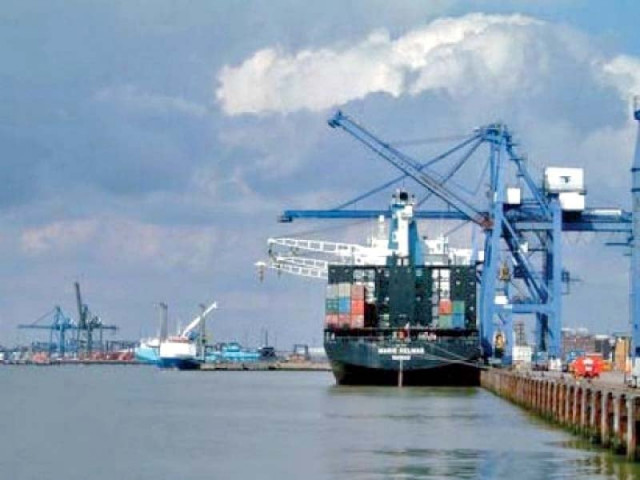Pakistan’s only deep-water port enters phase II of expansion
Hutchison Ports Pakistan will double installed capacity to 3.4m TEUs by end 2020

The port is capable of berthing the world’s largest container vessel of 25,000 TEUs as it has a depth of 18 metres at the outer approach channel and 16.5 metres on the berth side. PHOTO: FILE
“The expansion will enhance the installed capacity to handle 3.4 million containers of 20-foot length each by the end of 2020 compared to 1.5 million TEUs (twenty-foot equivalent units) at present,” General Manager and Head of Business Unit Captain Syed Rashid Jamil said while briefing a group of journalists at the expansion site on Monday.
A four-lane railway cargo track of around 4-5 kilometres inside the port facility, coupled with an increase in installed capacity of power production are also included in the second phase expansion plan.
The deep-water port is located at the Karachi Port Trust (KPT). It is a subsidiary of Hutchison Port Holdings of Hong Kong which enjoys 90% shareholding. KPT is a partner in the project. Some local transport and logistics firms have the rest 10% shareholding in the port. The port began commercial operations in February 2017.
Total cost of the project would be $1.4 billion, which includes KPT’s share of $800 million and Hutchison Ports Pakistan’s (HPP) contribution over $600 million.
So far, HPP has spent $450-500 million. “Estimates suggest that it would be spending close to $750-800 million by the time the second phase gets completed,” stated reliable sources.
The firm has opted for expansion despite the growth rate of cross-border transportation of the containerised cargo remaining flat at around 3.4 million TEUs in calendar year 2018 and it shrank 5% in the first four months (January-April) of the current year.
Gwadar port aims to become new Dubai
“We are expanding containerised cargo handling capacity as per our original plans of 2007 when we signed and initiated the project on built, maintain and transfer basis,” Jamil added.
The port is capable of berthing the world’s largest container vessel of 25,000 TEUs as it has a depth of 18 metres at the outer approach channel and 16.5 metres on the berth side. So far, it received the largest ever container ship of 11,923 TEUs - the China India Express - in December 2018.
Earlier, Pakistan was unable to handle containerised vessels of more than 8,000 TEUs.
The reliable sources noted that growth in the cross-border transportation of containerised cargo shrank in the current year after the incumbent government imposed conditions on fast moving consumers goods (FMCGs) sector including printing details and ingredients, halal certificate and expiry date on the products packaging.
The deep-water port has a 28-megawatts (MW) diesel-based captive power plant. It would increase the power production capacity by 8MW in the second phase.
China, the single largest trading partner of Pakistan, has remained the biggest source of containerised cargo transportation at the deep-water port. Besides, it also transports import and export containerised cargo to and from Europe and the US.
Published in The Express Tribune, May 7th, 2019.
Like Business on Facebook, follow @TribuneBiz on Twitter to stay informed and join in the conversation.



















COMMENTS
Comments are moderated and generally will be posted if they are on-topic and not abusive.
For more information, please see our Comments FAQ